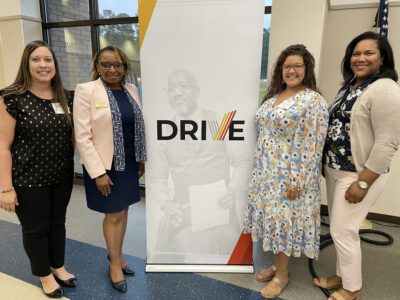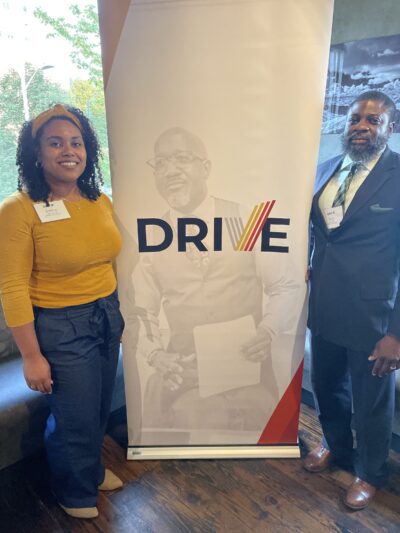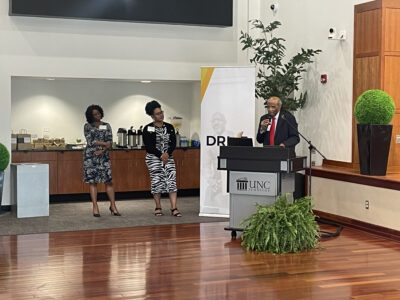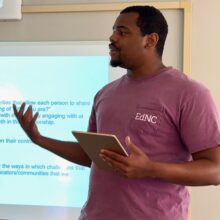
Share this story
|
|
In late October, the Dudley Flood Center for Educational Equity and Opportunity (Flood Center) held its kick-off event for the DRIVE Coalition. This marked the first of ongoing gatherings to focus on the racial, ethnic, and linguistic diversity of North Carolina’s K-12 educator workforce.
The statewide coalition is strategizing around the need to recruit, prepare, support, and retain educators of color.
Sign up for the EdDaily to start each weekday with the top education news.
The DRIVE Coalition
According to their website, the Flood Center “envisions an education system that provides every student in North Carolina with access to equitable, culturally responsive, and high-quality educational opportunities that lead to success in college, career, and citizenship.”

They lead several programs and events to realize this vision, including:
- Rural Teacher Leader Network: Organizing a network of eastern North Carolina educators to support the development of their equity and trauma-informed practice, while enabling collaboration across districts.
- Mapping the Movement: A series of convenings and a visual statewide map, promoting networking and resource sharing among organizations that are centering and being led by communities of color.
- Color of Education: An annual, full-day summit that features keynote speakers and various presentations, focused on making connections between the past and present while creating opportunities for collective action.
After the DRIVE tour and task force ended at the close of 2023, the Flood Center was unanimously selected to be the governing body for the continued work of the collective and has now launched the statewide coalition.
More on DRIVE



The coalition is made up of many of the original members of the DRIVE Task Force. The coalition is organized by three regions: Eastern, Central, and Western. Each region has a designated chair and co-leads, along with facilitators and advocates in each area.
The coalition’s advisory board includes:
- The Hunt Institute
- Profound Ladies
- Profound Gentlemen
- CREED
- DREAM
- The N.C. Department of Public Instruction
- The N.C. State Board of Education
- NCAE
- And the regional chairs and co-chairs
The Flood Center’s senior director, Dr. Deanna Townsend-Smith, stated that the local level is “where the work actually happens.”
Townsend-Smith said that “to have others create responses to help fulfill recommendations, so that therefore there can be a model across the state of what to replicate, is critically important to fulfilling the overall vision of a diverse educator workforce, which is beneficial to each and every student.”

Additionally, attendees of the kick-off heard from Alexandria Hoskins, executive director of systems coherence & strategic planning for Winston-Salem/Forsyth County Schools.
She shared about the district’s implementation of a local task force, DRIVE for Forsyth. According to Hoskins, the 42-person task force identified the need to address the representation disparities that exist in the racial make-up between students, teachers, and educators across the district.
Hoskin said that the task force has since developed principles, objectives, and a vision statement for their work. She said they will continue to assess current programmatic assets that the district already possesses as they develop their approach moving forward.
Over the next year, participants will meet a minimum of four times to discuss best practices, policy recommendations, and develop a collaborative initiative for their respective region. One of the four meetings will include the DRIVE Summit that is currently scheduled for January 2025.
History of DRIVE
DRIVE stands for Developing a Representative and Inclusive Vision for Education. In December 2019, Gov. Roy Cooper’s Executive Order No. 113 established the DRIVE Task Force, aimed at improving equity and inclusion education.
The task force was made up of parents and guardians, K-12 educators, state and local government personnel, and higher education personnel. Together, they released a final report that assessed the state’s K-12 educator diversity and included recommendations for increasing recruitment and retention of educators of color.

In 2023, the task force launched a statewide tour that sought to highlight best practices that aligned with their initiative. A few examples include:
- Several “Grow Your Own” teaching programs, focused on high school students engaging in teacher preparation curriculum and matriculating into partnered collegiate programs, often with the agreement to return to their home counties to teach for a designated period.
- Various higher education programs such as Call Me Mister at Western Carolina University and Marathon Teaching Institute at North Carolina Central University, both of which provide special support and mentorship to males interested in the teaching profession.
- Retention-focused organizations such as Profound Ladies and Profound Gentlemen, which provide support, networking, and professional development for educators of color.
Recommended reading




